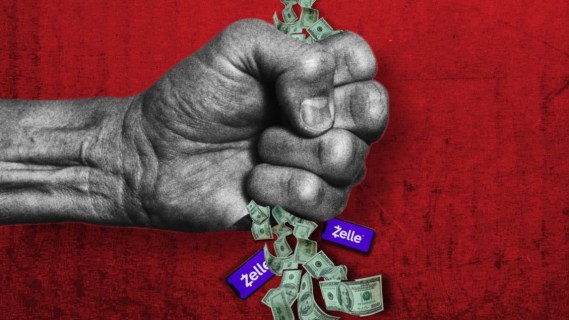
Business leaders and economists warn that punishing transactions in USD, as the Maduro government is preparing to do, can reignite inflation and increase informality.
By Caracas Chronicles – Marianela Palacios
Feb 14, 2022
By reforming the Tax on Big Financial Transactions Law, or IGTF, to apply a tax from 8% to 20% on transactions in USD in Venezuela, Nicolás Maduro is facing a dilemma similar to the one that part of the opposition stumbled upon when it asked for a recall referendum against him. If you consider Maduro illegitimate, how do you ask the CNE to remove him through a constitutional process? So when the government taxes transactions in dollars, isn’t it admitting as official a currency that has no proper legal grounds in the country’s current financial structure?
Anyhow, the government is spreading panic again, the worst thing in an economy, and keeping people in suspense as chavismo likes to do: nobody knows which definitive form this law, approved by the chavista-controlled National Assembly, will have once it’s published in the Official Gazette.
In the meantime, the main business chamber, Fedecámaras, is warning through its president, Carlos Fernández, that this tax reform will take the country away from the path of relative economic recovery started in 2021, after eight years in recession and four years of hyperinflation. The new IGTF will stop the economic growth without recovering trust in the bolivar, increasing national output, or performing any structural adjustment.
Fedecámaras asked the government to postpone the implementation of the law and improve it after consulting the private sector, because a 20% tax on a financial transaction doesn’t make sense. “You can’t tax with 8% the purchase of a security, this just kills the opportunity,” said Fernández. “This would bring deep problems in sectors that have gained momentum, such as the agricultural stock exchange, about to consolidate, or the stock exchange that so many people are trying to reactivate.”
Fernández says the law won’t protect people with low income, as the government’s propaganda insists on saying, in a country where 60% of transactions are done in USD. Besides, the new tax would impact entire chains of value and production, stimulating fiscal evasion, informality, shortages, and inflation. “Those cases where the tax is high will create incentives to stop producing or importing that good, and fiscal voracity will drive small businesses out of formality to evade taxes.” So the business chamber proposes to leave ordinary citizens out of the tax, as well as small businesses. “They shouldn’t tax the food staples that everyone relies on and consider that many small businesses aren’t even able to collect taxes.”
“This was supposed to be a tax for special taxpayers, but it includes everyone now,” professor Camilo London told Efecto Cocuyo. “A retired person, the delivery boy, any ordinary citizen paying in dollars will be taxed, no matter if one’s poor or rich, whether purchasing medicine or a luxury item,” added tax lawyer Mariela Llovera. There are no minimum quantities to be taxed, one dollar paid, even for corn or eggs, will generate a 3% tax. “This will bring multiple-taxing and impact personal finances of all taxpayers with a non-deductible payment.”
“People are using dollars after the value of the bolivar collapsed,” says Llovera. “So this reform will cut everyone’s purchasing power. If you spend 100 dollars in medicine, the bank will automatically debit from your account another 3 to 8 dollars in IGTF. If you give 50 dollars in cash to your mom and she spends them in a supermarket qualified as a passive subject, she would have to use up to 20% of that money to pay the IGTF. If you are buying school items for your kids and paying with an app like Binance or Zelle, you’ll have to pay a tax as well, up to 20% of your budget.”
What happens if this moves forward then?
“I don’t think this law could get us back to hyperinflation in 2022,” says economist Tamara Herrera, from consulting firm Síntesis Financiera. “But it will have an impact, depending on its final version. I think the plan is not to impact consumption but operations between companies. But we’ll see.” Other experts like the economist Leonardo Vera concur with her appreciation.
Lawmakers Jesús Faría and Orlando Camacho, president and first vice president of the AN commission for economy and finances, said the new tax won’t apply to the stock market, small stores and the public markets. But Ramón Lobo, former president of the Central Bank (BCV), said that any customer at a supermarket or a drugstore would have to pay a tax of 3% in dollars or crypto, or a tax of 2% in bolivars or petros.
In 2021, the tax and customs agency SENIAT collected 7.8 billion bolivars, or 2.2 billion dollars, according to Síntesis Financiera. 13% of that came from IGTF, about 300 million dollars. So in 2022 the government wants more – in the National Assembly they talked about collecting 5.4% more – but it could backfire if it inhibits consumption and sparks evasion.
Companies of some size have been making transactions in dollars, because they were paying an IGTF no higher than 2% in bolivars. Now, the National Assembly wants to protect the bolivar and punish the use of dollars.
According to Tamara Herrera, the reform would tax transactions in dollars to dollar accounts, not transactions in dollars with debit cards belonging to the national banking system. People would be taxed when paying through Zelle, for instance, not with any transactions that imply currency exchange. She thinks that applying IGTF to payments in foreign currency is attacking the symptom, not the cause of the decline of bolivars, and will affect the improvements achieved in the local payment environment.
…
Read More: Caracas Chronicles – The new tax that could deflate the economic recovery
…

